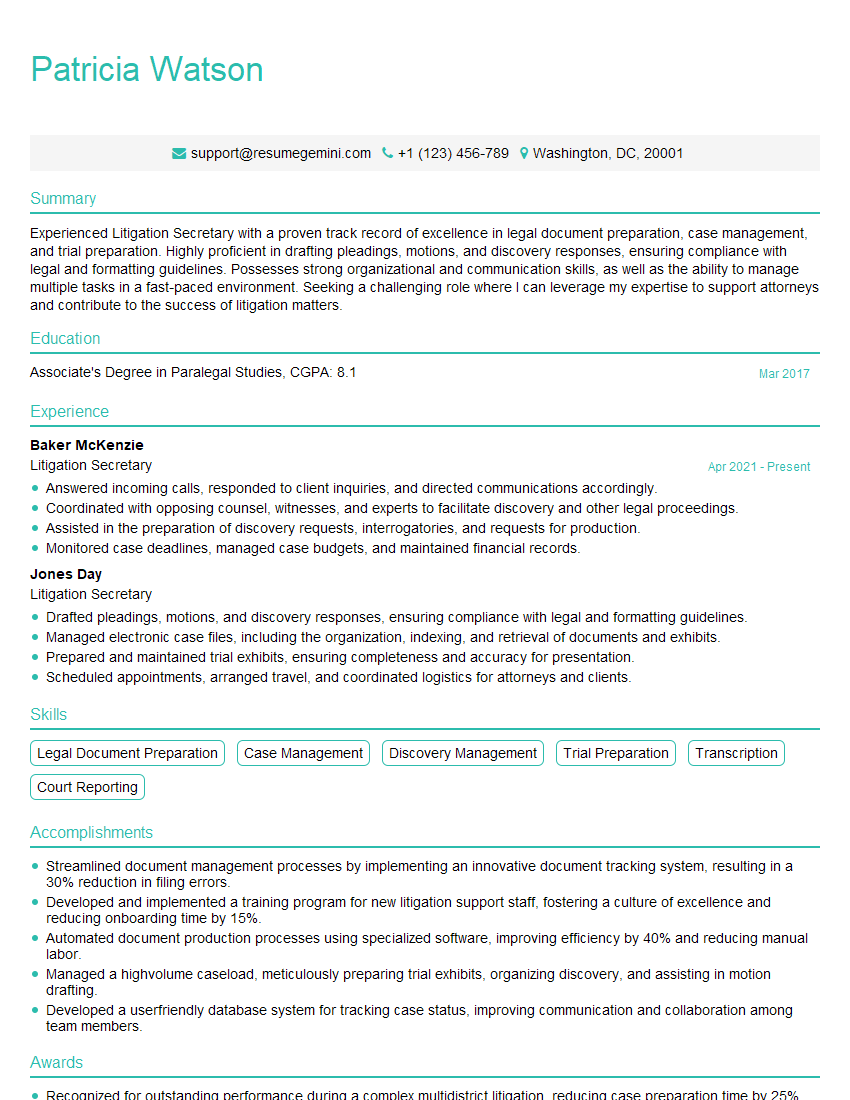Are you a seasoned Litigation Secretary seeking a new career path? Discover our professionally built Litigation Secretary Resume Template. This time-saving tool provides a solid foundation for your job search. Simply click “Edit Resume” to customize it with your unique experiences and achievements. Customize fonts and colors to match your personal style and increase your chances of landing your dream job. Explore more Resume Templates for additional options.

Patricia Watson
Litigation Secretary
Summary
Experienced Litigation Secretary with a proven track record of excellence in legal document preparation, case management, and trial preparation. Highly proficient in drafting pleadings, motions, and discovery responses, ensuring compliance with legal and formatting guidelines. Possesses strong organizational and communication skills, as well as the ability to manage multiple tasks in a fast-paced environment. Seeking a challenging role where I can leverage my expertise to support attorneys and contribute to the success of litigation matters.
Education
Associate’s Degree in Paralegal Studies
March 2017
Skills
- Legal Document Preparation
- Case Management
- Discovery Management
- Trial Preparation
- Transcription
- Court Reporting
Work Experience
Litigation Secretary
- Answered incoming calls, responded to client inquiries, and directed communications accordingly.
- Coordinated with opposing counsel, witnesses, and experts to facilitate discovery and other legal proceedings.
- Assisted in the preparation of discovery requests, interrogatories, and requests for production.
- Monitored case deadlines, managed case budgets, and maintained financial records.
Litigation Secretary
- Drafted pleadings, motions, and discovery responses, ensuring compliance with legal and formatting guidelines.
- Managed electronic case files, including the organization, indexing, and retrieval of documents and exhibits.
- Prepared and maintained trial exhibits, ensuring completeness and accuracy for presentation.
- Scheduled appointments, arranged travel, and coordinated logistics for attorneys and clients.
Accomplishments
- Streamlined document management processes by implementing an innovative document tracking system, resulting in a 30% reduction in filing errors.
- Developed and implemented a training program for new litigation support staff, fostering a culture of excellence and reducing onboarding time by 15%.
- Automated document production processes using specialized software, improving efficiency by 40% and reducing manual labor.
- Managed a highvolume caseload, meticulously preparing trial exhibits, organizing discovery, and assisting in motion drafting.
- Developed a userfriendly database system for tracking case status, improving communication and collaboration among team members.
Awards
- Recognized for outstanding performance during a complex multidistrict litigation, reducing case preparation time by 25%.
- Received a paralegal certification in electronic discovery, demonstrating advanced expertise in managing and processing digital evidence.
- Commended for exceptional client service, consistently exceeding expectations by providing timely and accurate case updates.
- Recognized for commitment to data security, ensuring compliance with ethical guidelines and maintaining the confidentiality of client information.
Certificates
- Certified Legal Secretary (CLS)
- Certified Paralegal (CP)
- National Association of Legal Assistants (NALA)
- American Association for Paralegal Education (AAfPE)
Career Expert Tips:
- Select the ideal resume template to showcase your professional experience effectively.
- Master the art of resume writing to highlight your unique qualifications and achievements.
- Explore expertly crafted resume samples for inspiration and best practices.
- Build your best resume for free this new year with ResumeGemini. Enjoy exclusive discounts on ATS optimized resume templates.
How To Write Resume For Litigation Secretary
- Quantify your accomplishments with specific metrics whenever possible, such as the number of pleadings drafted or cases managed.
- Highlight your proficiency in legal software and technology, such as case management systems and e-discovery tools.
- Showcase your attention to detail and ability to meet deadlines in a fast-paced environment.
- Tailor your resume to the specific requirements of each job you apply for, highlighting the skills and experience that are most relevant to the role.
- Proofread your resume carefully before submitting it to ensure there are no errors.
Essential Experience Highlights for a Strong Litigation Secretary Resume
- Draft and prepare pleadings, motions, and discovery responses in accordance with legal and formatting guidelines.
- Manage electronic case files, including the organization, indexing, and retrieval of documents and exhibits.
- Prepare and maintain trial exhibits, ensuring completeness and accuracy for presentation during legal proceedings.
- Schedule appointments, arrange travel, and coordinate logistics for attorneys and clients.
- Answer incoming calls, respond to client inquiries, and direct communications appropriately.
- Coordinate with opposing counsel, witnesses, and experts to facilitate discovery and other legal proceedings.
- Assist in the preparation of discovery requests, interrogatories, and requests for production.
Frequently Asked Questions (FAQ’s) For Litigation Secretary
What are the primary responsibilities of a Litigation Secretary?
The primary responsibilities of a Litigation Secretary include drafting legal documents, managing case files, preparing trial exhibits, scheduling appointments, and providing administrative support to attorneys.
What skills are essential for a successful Litigation Secretary?
Essential skills for a Litigation Secretary include legal document preparation, case management, trial preparation, transcription, and communication.
What is the educational background typically required for a Litigation Secretary?
Most Litigation Secretaries hold an Associate’s Degree in Paralegal Studies or a related field.
What is the job outlook for Litigation Secretaries?
The job outlook for Litigation Secretaries is expected to grow faster than average over the next decade.
What are the career advancement opportunities for Litigation Secretaries?
Career advancement opportunities for Litigation Secretaries include promotion to Legal Assistant, Paralegal, or other management roles within the legal field.
What is the average salary for a Litigation Secretary?
The average salary for a Litigation Secretary varies depending on experience, location, and company size, but typically ranges from $40,000 to $60,000 per year.
What are the benefits of working as a Litigation Secretary?
Benefits of working as a Litigation Secretary include job security, opportunities for professional development, and the chance to make a meaningful contribution to the legal system.